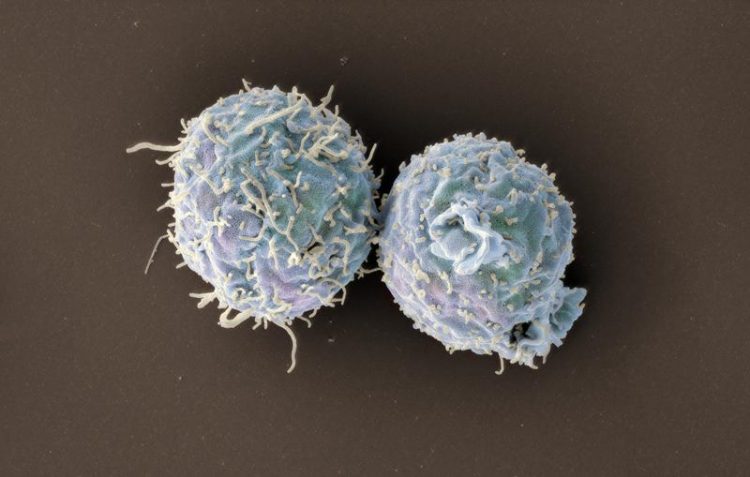Engineered T cells promote long-term organ transplant acceptance

Scanning electron microscopy image of engineered T cells lacking coronin 1. Image: Swiss Nanoscience Institute/University of Basel, Biozentrum
When someone is confronted with ‘foreign’ material, be it viruses, bacteria, fungi, but also donor organs following transplantation, immune cells called T cells come into action to inactivate and destroy the ‘foreign’ material.
Prof. Jean Pieters’ team at the Biozentrum of the University of Basel together with collaborating scientists have now described a way to selectively suppress the immune reaction of the body against the donor organ by modulating the protein coronin 1.
By blocking this protein in T cells, these immune cells do not attack the transplanted organ anymore. However, the T cells continue to keep viruses, bacteria and fungal infections in check. These findings could potentially provide new approaches for reducing graft rejection in the future.
Engineered T cells prevent organ rejection but still fight infections
Coronin 1 is a protein that regulates T cells, which are essential for detecting and destroying invaders of the body. These T cells also recognize a transplanted organ as foreign. In a mouse model, the team has now been able to relate these graft rejections by T cells to coronin 1.
“By removing coronin 1, we observed that the T cells not only massively suppressed the immune response to the transplanted organ but even actively prevented its rejection,” says first author Rajesh Jayachandran. “At the same time, we were astonished that coronin 1-depleted T cells continue to fight infections.”
Finding a tolerance pathway for organ transplantation
The lab of Jean Pieters originally defined coronin 1 as a host factor hijacked by pathogens to survive within immune cells. The new research shows that in T cells, coronin 1 modulates a signaling pathway that produces the so-called ‘second messenger’ molecule cAMP. In the absence of coronin 1, cAMP levels drastically increase in T cells, thereby making these cells tolerogenic to the transplanted organ.
However, the group found that when challenged with microbial infections, there is still a way to stimulate T cells to control infections, since microbes induce the expression of certain molecules that neutralize the cAMP-mediated suppression.
Immune defense manipulation for organ transplantation?
The new findings have now demonstrated a way of manipulating the body’s immune response by selectively suppressing the immune response of the host. Whether these findings may result in the development of therapies to allow retention of transplanted organs while retaining the ability to fight infections remains a task for the future.
Prof. Dr. Jean Pieters, University of Basel, Biozentrum, Tel. +41 61 207 14 94, email: jean.pieters@unibas.ch
Heike Sacher, University of Basel, Biozentrum, Communications, Tel. +41 61 207 14 49, email: heike.sacher@unibas.ch
Rajesh Jayachandran, Aleksandra Gumienny, Beatrice Bolinger, Sebastian Ruehl, Mathias Jakob Lang, Geoffrey Fucile, Saumyabrata Mazumder, Vincent Tchang, Anne-Kathrin Woischnig, Michael Stiess, Gabriele Kunz, Beatrice Claudi, Mathias Schmaler, Kerstin Siegmund, Jianping Li, Simone Dertschnig, George Hollander, Eva Medina, Urs Karrer, Despina Moshous, Dirk Bumann, Nina Khanna, Simona W Rossi and Jean Pieters
Disruption of Coronin 1 Signaling in T Cells Promotes Allograft Tolerance while Maintaining Anti-Pathogen Immunity
Immunity (2019), doi: 10.1016/j.immuni.2018.12.011
Media Contact
All latest news from the category: Life Sciences and Chemistry
Articles and reports from the Life Sciences and chemistry area deal with applied and basic research into modern biology, chemistry and human medicine.
Valuable information can be found on a range of life sciences fields including bacteriology, biochemistry, bionics, bioinformatics, biophysics, biotechnology, genetics, geobotany, human biology, marine biology, microbiology, molecular biology, cellular biology, zoology, bioinorganic chemistry, microchemistry and environmental chemistry.
Newest articles

After 25 years, researchers uncover genetic cause of rare neurological disease
Some families call it a trial of faith. Others just call it a curse. The progressive neurological disease known as spinocerebellar ataxia 4 (SCA4) is a rare condition, but its…

Lower dose of mpox vaccine is safe
… and generates six-week antibody response equivalent to standard regimen. Study highlights need for defined markers of mpox immunity to inform public health use. A dose-sparing intradermal mpox vaccination regimen…

Efficient, sustainable and cost-effective hybrid energy storage system for modern power grids
EU project HyFlow: Over three years of research, the consortium of the EU project HyFlow has successfully developed a highly efficient, sustainable, and cost-effective hybrid energy storage system (HESS) that…





















